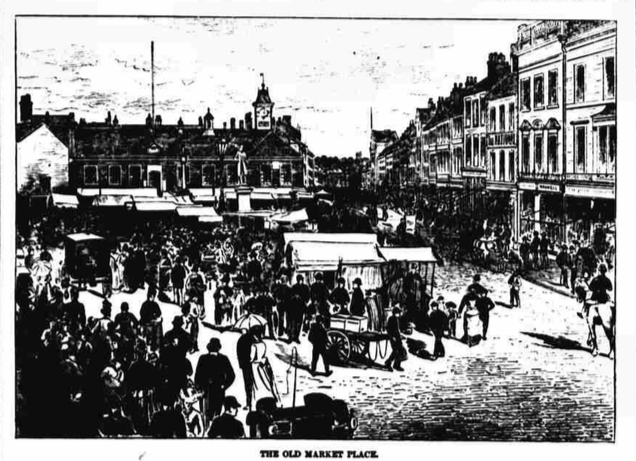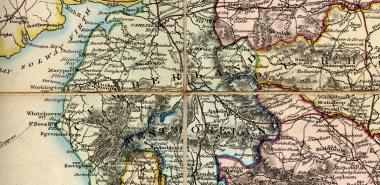
In my next few articles, I would like to consider the fascinating figure of Thomas Baty/Irene Clyde. As a transgender pioneer, Thomas Baty, (1869-1954), who was born in Carlisle, is an important person in Cumbria’s LGBTQ+ heritage. He is also of wider interest for anyone thinking about transgender issues, and about the cultural life of the earlier twentieth century.
Thomas Baty began his life in Carlisle, but ended it in Japan; he had an outwardly conventional career, but went on to co-found and edit the radical, genderqueer journal, “Urania”. Thomas served for many years as government legal advisor to the Japanese foreign office; identified as a feminist; became vegetarian; and wrote pioneering articles and books under the female pseudonym, Irene Clyde.
Thomas was born in Stanwix, Carlisle, Cumberland, in 1869. His mother was Mary (née Matthews), and his father, Thomas Baty, the cabinet-maker, with premises on Fisher Street, Carlisle. Thomas attended Carlisle Grammar School, and we can see from local newspaper reports, that he did well at school. He tried for the Hastings Exhibition for Queen’s College, the University of Oxford, in 1887, and was successful at his second attempt in 1888 – his father had died by this date.
The illustration above, from the “Carlisle Journal”, 1889, and drawn from a photograph by a local photographer, gives, I hope, a flavour of the Carlisle which Thomas Baty knew, when he was growing up.
Thomas took degrees from the universities of Oxford and Cambridge, establishing himself as an expert in international law. In fact, he served his articles with a firm of solicitors in his home town, Messrs Donald, Ostell, and Lightfoot, Carlisle.
This tells us something about the outward person – but it would be interesting to know what, if any, personal experiences and impressions contributed to his later unorthodox career. There is a 1902 polemic by Thomas Baty in Macmillan’s Magazine, “The Root of the Matter”, which argues forcefully against compulsory education, and for the independence and influence of the family.
Thomas Baty began to teach law at British universities, and to publish books on international law. In 1915-16, his career began to take a different turn. Through personal contacts, he applied for the post of legal advisor to the Japanese Foreign Office, and in 1916, sailed from London to Japan. The passenger list shows that on the same ticket were Mrs M. Baty, widow, Thomas’s mother, and Miss A M Baty, Anne Mary, his sister.
Thomas Baty had begun to be more active in promulgating his views on gender and on sexuality around this time. As Angela Ingram and Daphne Patai have shown, Baty used the female psuedonym, Irene Clyde. In 1909, Irene Clyde published the novel, Beatrice the Sixteenth. According to a contemporary newspaper notice, the novel concerns the adventures of Mary Hatherley, “explorer and geographer”; the heroine is wounded on her travels, and taken from the African desert to a strange land by strange people. This is in the utopian fantasy tradition, going back to Gulliver’s Travels, and further.
In the mysterious country of Armeria, gender considerations have been abolished, and the language of the inhabitants makes no use of gendered terms. However, Hatherley’s narrative does use feminine pronouns, and it appears that the land is peopled almost entirely by women, who even do the fighting. Baty/Clyde draws unfavourable comparisons between the praiseworthy conduct of this land, and the unenlightened, meat-eating, sexist, and heterosexual culture of Britain of the day; “between the old world and the new”, as the newspaper notice has it. Mary Hatherley goes on to spend the rest of her life with one of the Armerians.
In 1915-1916, Thomas Baty and other important figures founded the radical journal, “Urania”. It was published from 1916-1940, and boldly declared, “There are no ‘men’ or ‘women’ in Urania.” I hope to write more on this fascinating journal in my next post.
Acknowledgements:
I was first alerted to Thomas Baty/Irene Clyde by the LGBT+ exhibition, “Within and Beyond”, at the Museum of Lakeland Life and Industry, Kendal, curated by Dr Rachel Roberts; this included an exhibit of one of the surviving copies of “Urania”.
“Carlisle Patriot”, p.6, Friday 5 August, 1887
“Penrith Observer”, p.4, Tuesday 28 February, 1888
“Maryport Advertiser”, p.5, Saturday 30 June, 1894
“Folkestone Express, Sandgate, Shorncliffe & Hythe Advertiser”, p.7, Saturday 3 January, 1903
“The Queen”, p.37, Saturday 23 October, 1909. This newspaper includes Beatrice the Sixteenth in its column of book notices, “The Varied Shelf”.
Angela Ingram and Daphne Patai. Rediscovering Forgotten Radicals: British Women Writers, 1889-1939. Chapel Hill ; London: University of North Carolina Press, 1993 These authors have done important work in identifying the persona of Irene Clyde with Thomas Baty.
Eds Sonja Tiernan and Mary McAuliffe. Sapphists and Sexologists; Histories of Sexualities, Vol. 2. Newcastle upon Tyne : Cambridge Scholars, 2009 This discusses “Urania” in chapter 5.
Emily Hamer. Britannia’s Glory: A History of Twentieth Century Lesbians. London: Bloomsbury, 2016 This discusses Thomas Baty, Irene Clyde, Beatrice the Sixteenth, and “Urania” on pp.67-73
Maria Aline Salgueiro Seabra Ferreira. I Am the Other: Literary Negotiations of Human Cloning. Westport, Connecticut: Praeger, 2005 This discusses gender and language in Beatrice the Sixteenth on p.75
Introduction by Julian Franklyn to Thomas Baty’s “Vital Heraldry”, in “The Armorial”, 1962. Edinburgh: 1963 This mentions Thomas Baty’s Irene Clyde personality.
https://womenslibrary.org.uk/explore-the-library-and-archive/lgbtq-collections-online-resource/the-politics-of-urania Accessed 6 June, 2020. The Glasgow Women’s Library holds some of copies of Urania, as does the London School of Economics, and The Women’s Library at London Metropolitan University.
https://en.wikipedia.org/wiki/Thomas_Baty
Thomas Baty. “The Root of the Matter”, in “Macmillan’s Magazine”, Jan 1903, Vol.87(519), pp.194-198
https://www.lawbookexchange.com/pages/books/41346/thomas-baty/international-law

Pingback: Thomas Baty and Gender | LGBT+ Language and Archives
Pingback: Reflections on Thomas Baty | LGBT+ Language and Archives
Baty’s life was even more varied and strange. In Japan he dressed occasionally as a geisha. He acted as a tutor for a time to the emperor’s children. He remained in Japan during World War 2 and advised the fascist government on geopolitical matters. He was accused of being a traitor by the British government after the War, but I believe was not prosecuted. He died in Japan in 1954.
LikeLike
Thanks for your comment, and the interesting reference to Thomas Baty dressing as a geisha. Yes, Thomas Baty was not prosecuted and lived out his life in Japan. Peter Oblas discusses this in his articles, and also quotes Hugh Keenleyside on Thomas Baty wearing a gown.
LikeLike
May I ask where the Geisha reference comes from? Also would love to know the source for the idea of him tutoring the Showa emperor’s children. I myself lived many years in Japan and am currently researching Japanese sources regarding Mr. Baty. Cleaned his grave last month after a visit to say hello. Also I wonder whe
LikeLike
Thank you for your comment – that is interesting.
Sean Murphy says that Thomas Baty “often appeared in public dressed in the costume of a Geisha”, on p.189, Chp. 8 of his book, Letting the Side Down, Stroud: Sutton, 2003.
However, he doesn’t give a reference for this.
LikeLike